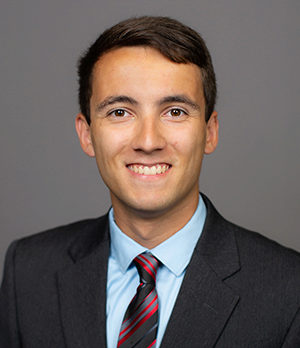 |
| Paul Farmer GTRI 2019 Undergraduate Researcher of the Year |
The Georgia Tech Research Institute (GTRI) has named third-year Aerospace Engineering School student Paul Farmer as its 2019 Undergraduate Researcher of the Year.
The Bentonville, Arkansas native was lauded by his GTRI colleagues for "his performance, attitude and contributions to the Air National Guard Program Office [ANGPO] mission," over the last two semesters, when he co-opped with GTRI's Electronic Systems Laboratory.
"Paul has been a fantastic team member helping us with flight test planning and analysis," said senior research engineer Chris Maston. "His professionalism and engineering abilities reflect great credit upon the GT-AE curriculum and rigor."
In addition to his co-ops at GTRI, Farmer learned to simulate a variety of fluid dynamic phenomena related to airfoils, wind turbines, bifurcated arteries, and other external and internal flow when he did CFD research with Regents Professor Lakshmi Sankar this past semester.
"Paul is a very bright, hard-working researcher with strong analytical and computational skills," Sankar said of his protege.
A BS/MS Honors student, Farmer said he plans to pursue a master's degree from Tech after finishing up his BSAE in May 2021.
"After that, I’d like to continue aerospace research at GTRI, continuing to solve problems for the Air National Guard," he said. "That said, I think my dream problem would be helping to solve Urban Air Mobility problems."
As a co-op student Paul focused on critical data analysis and python scripting, where his efforts enhanced analysis and helped to develop an automated debrief tool to support the Air National Guard Air Force Reserve Test Center.
"We kept throwing him challenges and he’d overcome them. There was no problem he couldn’t solve, so we kept giving him more," said Maston.
"Paul’s hard work and exemplary engineering allowed the ANGPO team to quickly analyze results and provide a top-notch report and presentation to the customer. The detailed results and recommendations allowed senior Air Force leaders to make an informed acquisition decision and provided the system contractor with a priority list of fixes. Without the efforts of Paul, it would have been very difficult for the team to be able to meet the strict timelines."
For his part, Farmer explains his extraordinarily successful co-op experience as being the right combination of interests and critical needs.
"Over the course of my first co-op semester, I was gradually introduced to the data analysis research done by our team until I found myself doing my own data analysis. I hadn’t really considered data analysis research in aerospace engineering until I began this co-op. However, I quickly found it very rewarding when I could present concrete results to the team lead based entirely on analysis I had done."